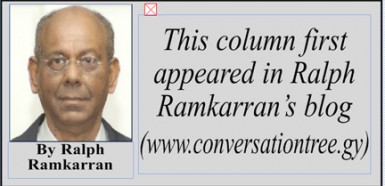The government has deemed as suitable the bond owned by Linden Holdings in Sussex Street, Georgetown, which it contracted to store pharmaceuticals at $1,200 a square foot, when a bond for $228 a square is available. The government said that the rental will be negotiated downwards and if the negotiations are unsuccessful then twelve months notice of termination in accordance with the agreement would be given. At $12 million a month, this will cost the Guyanese taxpayer $144 million, payable to Linden Holdings for an initial $25 million investment which it has already recovered as an initial advance.
 The government might make mistakes, as Vice President Ramjattan admitted, but it does not lack an innovative and fertile imagination. The objections to the government-owned Diamond bond, which has been approved as suitable by international agencies, are that a fire can occur and that the traffic situation is not conducive!
The government might make mistakes, as Vice President Ramjattan admitted, but it does not lack an innovative and fertile imagination. The objections to the government-owned Diamond bond, which has been approved as suitable by international agencies, are that a fire can occur and that the traffic situation is not conducive!
These excuses to justify continuing with a horrendously bad deal makes it difficult to dispel the notion that the government is playing fast and loose with taxpayers’ moneys and that the Cabinet sub-committee was not appointed to apply a whitewash.
Somewhere, somehow, a decision was made to sole source a bond to store pharmaceuticals because the offer of $228 a square foot being allegedly paid was unconscionably high, even though a government-owned bond is available. Somehow, Linden Holdings purchased a building in March for $25 million. Somehow, Linden Holdings was sole sourced to provide the bond. The sole sourcing had to have taken place at the time of or shortly after the purchase because the contract is dated June 1. It is therefore difficult not to believe that the building was purchased in the expectation that it will be sole sourced by government to store pharmaceuticals. Somehow, before preparations of the building were complete and the storing of drugs commenced, Linden Holdings was paid in July the advance of $25 million.
The Cabinet sub-committee has justified this grossly uncompetitive contract on the ground that a fire can occur and traffic is heavy at certain times on the East Bank. Well, a fire can also occur at the bond owned by Linden Holdings. What happens then? The fire hazard is a potential danger that all owners of buildings have to guard against by deploying known fire prevention mechanisms, not having alternate structures, just in case.
But having regard to the decision of the Cabinet sub-committee, and the ‘just in case’ principle of governance now adopted, word around town is that the Cabinet has decided to appoint a Cabinet sub-committee to establish a national fire plan, just in case, starting with the health sector. The sub-committee would be the same but may now include the Minister of Public Health and it would initially look at measures to sole source buildings countrywide, have them equipped by the owners as hospitals, for which the government will advance the funds, and have them on standby just in case there is a fire at one of the hospitals.
Since government work cannot be interrupted, the Cabinet sub-committee will have to make preparations for government business to continue if there is a fire at one or more ministries. Take, for example, the NIS office or the post offices, where pensioners collect their pensions. Great suffering will ensue if these offices are affected by fire. Government can sole source alternate buildings, have them equipped by advances to the owners and pay rent and have them vacant in case there is a fire.
During the era of the last government, public/private partnerships became popular. The Bank of Guyana might collaborate with the private banks to print notes equivalent to the amount that is held by banks in case one or all of them are destroyed by fire. Imagine how convenient it would be if those banks are able to move seamlessly into the buildings which they have on standby and equipped just in case there are fires. The day after the fire they would receive the moneys from the Bank of Guyana and be back in business. A more efficient example of public/private partnership can hardly be conceived.
Our large manufacturing concerns such as Banks DIH and DDL would be advised by the Cabinet sub-committee to construct by sole sourcing alternate factories fully equipped in the event of fire. This will ensure that production is not interrupted and the imbibers of El Dorado and XM will not be deprived. I’m partial to Banks beer myself and would be horrified at having to endure an interruption in supply.
Neither Guyanese nor the government would have forgotten that about two years ago a pyromaniac was roaming the city. It is believed that deriving from this experience the government has a secret plan, when the oil moneys start to flow, to appoint a Cabinet sub-committee to plan for the construction and equipping of an alternate city by sole sourcing, just in case there is a damaging fire as has occurred in the past.





